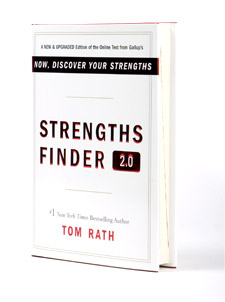Review: ‘StrengthsFinder 2.0’
By Wade KwonReview at a glance: While “StrengthsFinder 2.0” is a quick read and a relatively inexpensive way to assess career talents, it doesn’t necessarily prove its worth doing so.
• • •
 A friend of mine has struggled with what to do in life. With divergent interests, she wasn’t sure where to focus for her career or even next steps.
A friend of mine has struggled with what to do in life. With divergent interests, she wasn’t sure where to focus for her career or even next steps.
And I was of little help. I can assist with networking and resumes, but I have little skill in vocational guidance. I often don’t know what you should be when you grow up.
I became interested in skills assessment through “StrengthsFinder 2.0” upon the recommendation of a business associate. The book is really a manual for an online test to pick the reader’s Top 5 strengths from a list of 34.
Each copy has a scratch-off window to get the code for the test, which takes about a half-hour. (So those buying the book used will likely not receive the full benefits.)
My strengths, in order:
- Deliberate
- Analytical
- Relator
- Competition
- Individualization
I read through the descriptions, which came with suggestions for career areas that match those strengths. None of these are terribly surprising, but at least now I have an extended vocabulary to distinguish myself among professionals.
Being analytical, I like to see numbers back up an argument. Author Tom Rath’s premise is that we often spend time shoring up our weaknesses when we could instead by improving our strengths. In the long run, he argues, that approach will yield far more results.
His example is Daniel “Rudy” Ruettiger, the walk-on at Notre Dame who never gave up on his dream of playing football there. While Rudy may be the classic underdog, he spends a lot of time and energy to play a single down. Compare that to his teammates who have a natural talent for the game and develop it through practice — and far less effort than Rudy — into a strength.
What the book doesn’t provide me the analyst is numbers and results. How has determining Top 5 strengths helped readers develop into superstars? Which is the best approach overall: focusing on strengths, focusing on weaknesses or both? Rath cites a study that shows employee satisfaction tends to be higher when they and their supervisors are focused on strengths, but I need more information.
Readers may find the book confirms their self-diagnosis on where their strengths lie. Or they may discover their true talents, obscured by a working life of routine and little introspection. Beyond that, I’m not certain.
“StrengthsFinder 2.0” is a quick read and a relatively inexpensive way to assess career talents. But it seems we’ll have to wait till version 3.0 to find out if such navel gazing has any real value.
- “StrengthsFinder 2.0”: Amazon, $14.97 hardcover | $13.47 Kindle [aff. links]
• • •
Looking for something to read? Check out the Sundayread suggestions.
About this entry
- Post:
- Review: ‘StrengthsFinder 2.0’
- Published:
- 02.19.12 | 4.06 pm
- Share:
- Next post:
- Wade’s weekly Twitter log for 2012-02-26
- Previous post:
- Wade’s weekly Twitter log for 2012-02-19



5 yips
Jump to comment form | comments rss [?] | trackback uri [?]